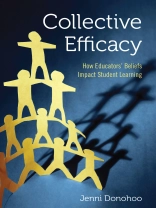Improve student outcomes with collective teacher efficacy.
Is your school climate promoting meaningful change? Recent research suggests that Collective Efficacy (CE) is the number one factor influencing student achievement.
CE—the belief that, through collective actions, educators can influence student outcomes and improve student learning—is changing the educational ecosystem. A faculty with high Collective Efficacy show greater effort and persistence, willingness to try new teaching approaches, and attend more closely to struggling students’ needs. This book presents practical strategies and tools for increasing student achievement by sharing:
- Rationale and sources for establishing CE
- Conditions and leadership practices for CE to flourish
- Professional learning structures/protocols that promote CE
If educators’ realities are filtered through the belief that they can do very little to influence student achievement, then it is likely these beliefs will manifest in their practice. Help teachers develop mastery and CE by employing these key strategies.
‘Acclaimed staff developer and experienced educational consultant Jennifer Donohoo puts the sword to the mistaken idea that the best way to improve teaching is by evaluating individuals. Donohoo takes an old idea—collective efficacy—strengthens it with a rigorous research base, and brings it alive through her countless observations of teachers′ practice.
Collective Efficacy is about the overwhelming power that teachers have to improve student learning and achievement when they work together, explore every avenue open to them, and persist relentlessly once they have found the best ways forward. This book will turn many people′s assumptions about how best to improve student achievement on their head. Probably one of the very best education books of the year.’
Andy Hargreaves, Brennan Chair in Education
Boston College
Зміст
List of Figures and Tables
Preface
Acknowledgments
About the Author
Chapter 1. Collective Teacher Efficacy
What Is Collective Teacher Efficacy?
Why Is Collective Teacher Efficacy Important?
Efficacy Shaping Information
In Conclusion
Chapter 2. Consequences of Collective Teacher Efficacy
Greater Effort and Persistence
Willingness to Try New Approaches
Conveying High Expectations
Fostering Learner Autonomy
Decreasing Disruptive Behavior
Increased Commitment
Enhanced Parental Involvement
In Conclusion
Chapter 3. Fostering Collective Teacher Efficacy
Six Enabling Conditions for Collective Teacher Efficacy
Fostering Collective Efficacy: A Theory of Action
In Conclusion
Chapter 4. Enhancing Collective Efficacy Through Professional Learning
Seven Characteristics of Effective Professional Learning
Efficacy Enhancing Collaborative Learning Structures
Efficacy Enhancing Protocols
In Conclusion
Chapter 5. Leaders Utilize a Collaborative Inquiry Framework to Organize Actions
Getting Started
Stage 1: Plan
Stage 2: Act
Stage 3: Observe
Stage 4: Assess
In Conclusion
Resources
A. Template for Documenting Student Learning
B. Team Success Analysis Protocol
C. Observer as Learner Protocol
D. Evidence Analysis Protocol
E. Diversity Rounds Protocol
F. Developing a Shared Vision Protocol
G. School Visits Protocol
H. World Café Protocol
I. Assignment Analysis Protocol
J. The Enabling Conditions for Collective Teacher Efficacy Questionnaire
K. Leadership Theory of Action
L. Characteristics of Collaborative Leadership Inquiry Continuum
References
Index
Про автора
Jenni Donohoo is the director of Praxis-Engaging Ideas, Inc and a project manager for the Council of Ontario Directors of Education (CODE). Jenni has a Ph D in Educational Studies and Supervisory Officer Qualifications. Jenni is a former classroom teacher and currently works with system, school leaders, and teachers around the world to support high quality professional learning. She has authored many peer-reviewed publications and three best-selling books, including Collaborative Inquiry for Educators, The Transformative Power of Collaborative Inquiry (with Moses Velasco), and Collective Efficacy: How Educators’ Beliefs Impact Student Learning. Jenni’s areas of expertise include collective efficacy, metacognition, adolescent literacy, and facilitating collaborative learning structures.












